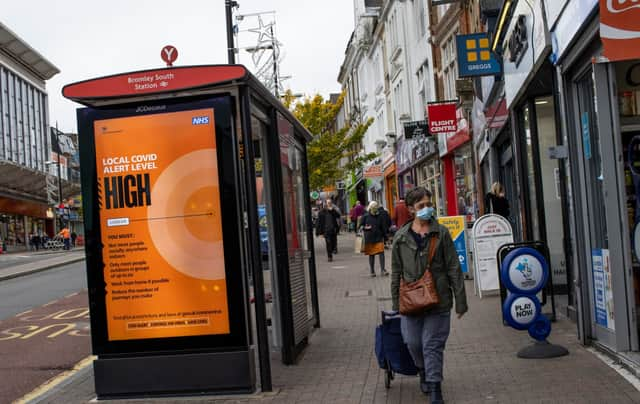What Covid alert ‘level 3’ means as UK is downgraded ahead of next lockdown phase


The Covid alert level in the UK has been downgraded following the success of the vaccination programme and lockdown restrictions.
The four chief medical officers of the UK have said the threat level should be lowered from “level 4” to “level 3”, after a “consistent” fall in coronavirus cases, hospital admissions and deaths.
Advertisement
Hide AdAdvertisement
Hide AdWhat does ‘level 3’ mean?
The change to ‘level 3’ status means that the epidemic is in general circulation, but transmission of the virus is no longer considered to be high or rising exponentially.
In a statement, the chief medical officers of England, Northern Ireland, Scotland and Wales, said: “Following advice from the Joint Biosecurity Centre and in the light of the most recent data, the UK chief medical officers and NHS England national medical director agree that the UK alert level should move from level 4 to level 3.
“Thanks to the efforts of the UK public in social distancing and the impact we are starting to see from the vaccination programme, case numbers, deaths and Covid hospital pressures have fallen consistently. However, Covid is still circulating with people catching and spreading the virus every day so we all need to continue to be vigilant. This remains a major pandemic globally.
“It is very important that we all continue to follow the guidance closely and everyone gets both doses of the vaccine when they are offered it.”
Advertisement
Hide AdAdvertisement
Hide AdThe change comes as experts said that the nation is in a “strong position” to press ahead with the easing of coronavirus restrictions, with the Prime Minister expected to announce indoor mixing and hugging loved ones will be permitted in England from next week.
Boris Johnson is holding a press conference in Downing Street on Monday (10 May) to announce the next steps in England’s road map out of lockdown.
It is expected that Mr Johnson will confirm that England can press ahead with the next phase out of lockdown from 17 May which allows more freedoms both in and outdoors.
The government has said the latest data suggests easing restrictions from this date is unlikely to risk a resurgence in infections, and latest figures show a third of UK adults are now fully vaccinated against coronavirus, with more than 53 million vaccine doses administered overall.
Advertisement
Hide AdAdvertisement
Hide Ad‘Act responsibly’
Oxford University’s regius professor of medicine told Good Morning Britain that data from vaccination programmes from the UK, Israel and the US shows a “rather rapid fall-off” in cases of disease, hospital admissions and deaths after rising numbers of people were given their first dose of vaccine.
Professor Sir John Bell said: “It’s a really very striking fall in all those things.
“I do think that we’re in a very strong position to go forward now with fewer restrictions and try and get back to normal.”
While figures for hospital admissions and new infections are similar to low levels seen last August, a member of the Scientific Pandemic Influenza Group on Modelling (Spi-M) has urged people to “act responsibly” as restrictions are lifted.
Advertisement
Hide AdAdvertisement
Hide AdDr Mike Tildesley, from the University of Warwick, told BBC Breakfast: “I think it’s actually very important for our mental health and wellbeing that we can hug our loved ones, but to me the key message is, if and when this comes in, we need to remember that the pandemic hasn’t gone away.
“We are still a few steps away from normality, so it’s really great that we can hug our loved ones, but what we need to remember is we need to be a little bit careful.”
He said that the easing of restrictions could see the R number rise above 1, but added: “The key thing for me is what we want to avoid is hospital admissions going up and people dying going up.
“And if we can keep those out of the low levels they are then hopefully this resumption of hugging can be done safely and we can proceed again to the June 21 relaxation.”